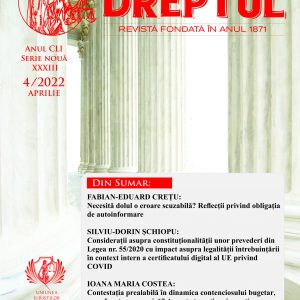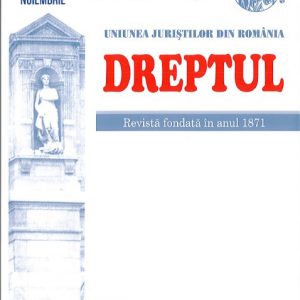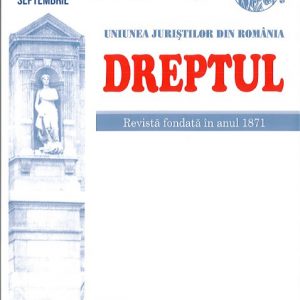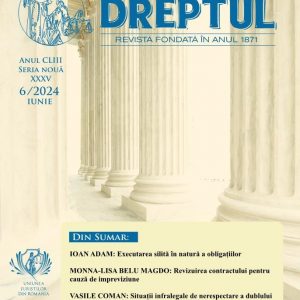-
 In essence, the expropriation procedure goes through two stages, the administrative stage and the judicial stage, the common law in the matter being represented by the Law No 33/1994, as amended and supplemented. The litigation procedure is criticizable however, in many aspects, for the lack of transparency and of access to data, from the perspective of the holder of the restricted real right. Thus, although in the preamble of this normative act it is affirmed the necessity of equalizing the right of private ownership with the public interest, the latter has priority in many of the situations that have arisen in practice.
In essence, the expropriation procedure goes through two stages, the administrative stage and the judicial stage, the common law in the matter being represented by the Law No 33/1994, as amended and supplemented. The litigation procedure is criticizable however, in many aspects, for the lack of transparency and of access to data, from the perspective of the holder of the restricted real right. Thus, although in the preamble of this normative act it is affirmed the necessity of equalizing the right of private ownership with the public interest, the latter has priority in many of the situations that have arisen in practice. -
 The participation of a tenderer in insolvency in a procedure for the award of a public procurement contract is regulated, mainly, by the directives on public procurement and by the laws which transpose them in the Member States. Within the current generation of directives on public procurement, the exclusion of the tenderer in insolvency is still classified into the category of facultative reasons of exclusion. However, as an element of novelty, if a Member State of the European Union decides to turn this reason of exclusion from facultative into mandatory, the State has the right to regulate certain circumstances in which the contracting authorities are prohibited from excluding such tenderer from the procedure. Whenever such regulation is contained in the national acts of transposition of directives, the contracting authority becomes bound to establish whether the conditions that impose the maintenance of the tenderer the procedure are met. The Romanian legislator has chosen to regulate that the contracting authority can not exclude from the award procedure the tenderer that is in the phase of observation or reorganization, if certain conditions are met. Having in view this obligation to establish whether certain conditions are met in order to maintain the tenderer in the phase of observation or of reorganization, as well as the amendments brought by the new directives in the matter of exercise of the right of the contracting authority to request clarifications, it is important to determine the extent to which, under the influence of the new regulations, the assessment commission will have to take a proactive approach or not, in order to decide whether to exclude or not such a tenderer.
The participation of a tenderer in insolvency in a procedure for the award of a public procurement contract is regulated, mainly, by the directives on public procurement and by the laws which transpose them in the Member States. Within the current generation of directives on public procurement, the exclusion of the tenderer in insolvency is still classified into the category of facultative reasons of exclusion. However, as an element of novelty, if a Member State of the European Union decides to turn this reason of exclusion from facultative into mandatory, the State has the right to regulate certain circumstances in which the contracting authorities are prohibited from excluding such tenderer from the procedure. Whenever such regulation is contained in the national acts of transposition of directives, the contracting authority becomes bound to establish whether the conditions that impose the maintenance of the tenderer the procedure are met. The Romanian legislator has chosen to regulate that the contracting authority can not exclude from the award procedure the tenderer that is in the phase of observation or reorganization, if certain conditions are met. Having in view this obligation to establish whether certain conditions are met in order to maintain the tenderer in the phase of observation or of reorganization, as well as the amendments brought by the new directives in the matter of exercise of the right of the contracting authority to request clarifications, it is important to determine the extent to which, under the influence of the new regulations, the assessment commission will have to take a proactive approach or not, in order to decide whether to exclude or not such a tenderer. -
 Damages can be assessed by the court, by law or by the willful agreement of parties. This study analyzes the notion of damages, the conditions for awarding damages, as well as their assessment by the court and their legal assessment. The purpose of assessment of damages incurred by the creditor is that of reinstating the creditor to the situation in which it would have been found, if the debtor had voluntarily performed the obligations assumed by concluding the contract. Judicial assessment of damages is made by judgment and involves the judge’s examination of all the conditions for undertaking contractual liability, particularly with regard to the prejudice caused to the creditor by the debtor’s non-performance of obligations. Legal assessment of damages occurs in the cases regulated by Articles 1535 and 1536 of the new Civil Code and falls within the scope of obligations that have as object the service of granting a sum of money, to which the legislator also adds the case of obligations to do, which can be assessed in money.
Damages can be assessed by the court, by law or by the willful agreement of parties. This study analyzes the notion of damages, the conditions for awarding damages, as well as their assessment by the court and their legal assessment. The purpose of assessment of damages incurred by the creditor is that of reinstating the creditor to the situation in which it would have been found, if the debtor had voluntarily performed the obligations assumed by concluding the contract. Judicial assessment of damages is made by judgment and involves the judge’s examination of all the conditions for undertaking contractual liability, particularly with regard to the prejudice caused to the creditor by the debtor’s non-performance of obligations. Legal assessment of damages occurs in the cases regulated by Articles 1535 and 1536 of the new Civil Code and falls within the scope of obligations that have as object the service of granting a sum of money, to which the legislator also adds the case of obligations to do, which can be assessed in money. -
 The European arrest warrant is an extremely relevant subject these days, being one of the concerns of the European lawmaker, the EU Member States and the national authorities (Ministry of Justice, courts of law, prosecutor’s offices, police structures) involved in this field. In this article, the author presents the main particularities of the European arrest warrant enforcement in the EU Member States, emphasizing both its positive aspects and the difficulties met by the Member States in transposing the provisions of the Framework Decision no.2002/584/JHA of 13 June 2002 on the European arrest warrant and the surrender procedures between Member States.
The European arrest warrant is an extremely relevant subject these days, being one of the concerns of the European lawmaker, the EU Member States and the national authorities (Ministry of Justice, courts of law, prosecutor’s offices, police structures) involved in this field. In this article, the author presents the main particularities of the European arrest warrant enforcement in the EU Member States, emphasizing both its positive aspects and the difficulties met by the Member States in transposing the provisions of the Framework Decision no.2002/584/JHA of 13 June 2002 on the European arrest warrant and the surrender procedures between Member States. -
 The European arrest warrant is an extremely relevant subject these days, being one of the concerns of the European lawmaker, the EU Member States and the national authorities (Ministry of Justice, courts of law, prosecutor’s offices, police structures) involved in this field. In this article, the author presents the main particularities of the European arrest warrant enforcement in the EU Member States, emphasizing both its positive aspects and the difficulties met by the Member States in transposing the provisions of the Framework Decision no.2002/584/JHA of 13 June 2002 on the European arrest warrant and the surrender procedures between Member States.
The European arrest warrant is an extremely relevant subject these days, being one of the concerns of the European lawmaker, the EU Member States and the national authorities (Ministry of Justice, courts of law, prosecutor’s offices, police structures) involved in this field. In this article, the author presents the main particularities of the European arrest warrant enforcement in the EU Member States, emphasizing both its positive aspects and the difficulties met by the Member States in transposing the provisions of the Framework Decision no.2002/584/JHA of 13 June 2002 on the European arrest warrant and the surrender procedures between Member States. -

-
 This scientific approach debates and proposes solutions for a problem of judicial practice also reflected in the doctrine of speciality, namely whether it subsists the offence of tax evasion provided in Article 9 (1) b) or c) of the Law No 241/2005, whose active subject is a legal person, in case of absence of the accounting records of the taxpayer. The author’s certain conclusion is based on arguments related to the legal text and which the practice has embraced as a corollary, and he proposes a solution in the sense that the judicial bodies may analyse that all the constituent elements of the reference offence are present even in the absence of the documents of accounting records. Likewise, the article also deals tangentially with a possible problem related to the constitutionality of a legal phrase that is part of the constituent elements of the offence of tax evasion and criticizes the redundant and incoherent phrasing of the legislator.
This scientific approach debates and proposes solutions for a problem of judicial practice also reflected in the doctrine of speciality, namely whether it subsists the offence of tax evasion provided in Article 9 (1) b) or c) of the Law No 241/2005, whose active subject is a legal person, in case of absence of the accounting records of the taxpayer. The author’s certain conclusion is based on arguments related to the legal text and which the practice has embraced as a corollary, and he proposes a solution in the sense that the judicial bodies may analyse that all the constituent elements of the reference offence are present even in the absence of the documents of accounting records. Likewise, the article also deals tangentially with a possible problem related to the constitutionality of a legal phrase that is part of the constituent elements of the offence of tax evasion and criticizes the redundant and incoherent phrasing of the legislator. -
 Ideea de reparație este, cum scria un autor, „una din cele mai vechi idei morale ale omenirei” (G. Ripert, La règle morale dans les oblig. civiles nr. 121, p. 223). În decursul timpurilor ea a suferit o serie de transformări, a parcurs mai multe etape, rezumate în cele 4 subtitluri ale studiului de față, care urmărește numai să schițeze în linii mari sensul acestei atât de interesante evoluții, care are semnificația drumului penibil al însăși ideei de Dreptate. Noțiunea de răspundere, în adevăr, se situiază în centrul tuturor instituțiunilor juridice care au de obiect reglementarea raporturilor între indivizi în societate, având un rol regulator și sancționator, întru cât tinde la păstrarea echilibrului rupt prin actele ilicite, fie că sunt violări de obligațiuni contractuale, fie că au caracterul și mai grav al călcării unor norme de conduită, pe pare societatea însăși le impune și îndeosebi acea normă negativă universală de neminem laedere, care constitue în esență principiul din care decurge însăși ideea de răspundere.
Ideea de reparație este, cum scria un autor, „una din cele mai vechi idei morale ale omenirei” (G. Ripert, La règle morale dans les oblig. civiles nr. 121, p. 223). În decursul timpurilor ea a suferit o serie de transformări, a parcurs mai multe etape, rezumate în cele 4 subtitluri ale studiului de față, care urmărește numai să schițeze în linii mari sensul acestei atât de interesante evoluții, care are semnificația drumului penibil al însăși ideei de Dreptate. Noțiunea de răspundere, în adevăr, se situiază în centrul tuturor instituțiunilor juridice care au de obiect reglementarea raporturilor între indivizi în societate, având un rol regulator și sancționator, întru cât tinde la păstrarea echilibrului rupt prin actele ilicite, fie că sunt violări de obligațiuni contractuale, fie că au caracterul și mai grav al călcării unor norme de conduită, pe pare societatea însăși le impune și îndeosebi acea normă negativă universală de neminem laedere, care constitue în esență principiul din care decurge însăși ideea de răspundere. -
 In this study the author presents the focus points regarding the evolution of maritime laws and the most important aspects in respect of free shipping and trading between states. Therefore, there are examined legal aspects concerning the status of all the motorways of the sea, the natural straits, the ship registration and the ownership of the vessel. The Geneva Convention on the High Seas of 1958, the United Nation Convention on the Law of the Sea of 1982 and the United Nations Conference on Trade and Development are essential and represent the basis for today’s maritime laws and regulations.
In this study the author presents the focus points regarding the evolution of maritime laws and the most important aspects in respect of free shipping and trading between states. Therefore, there are examined legal aspects concerning the status of all the motorways of the sea, the natural straits, the ship registration and the ownership of the vessel. The Geneva Convention on the High Seas of 1958, the United Nation Convention on the Law of the Sea of 1982 and the United Nations Conference on Trade and Development are essential and represent the basis for today’s maritime laws and regulations. -
 The labour law – a branch and science of the Romanian law system – has come a long way to the present days, when it fully manifests its specificity and autonomy that characterizes it. The doctrine evokes a „labour contract” concluded according to rules of the Roman law. In the Middle Ages, the Romanian principalities did not know regulations regarding legal labour relations. It was only in the Civil Code of 1864 that there were established specific regulations of some civil contracts which included some elements of some labour relations. The appearance and development of the industry determined, at the end of the 19th century and the beginning of the 20th century, the adoption of some legal norms aimed at the protection of workers. The labour legislation was invigorated due to the rules of the International Labour Organization, established in 1919. Our country, as a founding member, has ratified the essential conventions of this organization in the interwar period, but also later, to the present days. About a labour law, distinct, autonomous in Romania, one can speak only after the entry into force of the Labour Code of 1950. The development of the Romanian society, its economic and social level have also determined the evolution of the labour legislation and of the labour law, as it will be shown in the elaborated study.
The labour law – a branch and science of the Romanian law system – has come a long way to the present days, when it fully manifests its specificity and autonomy that characterizes it. The doctrine evokes a „labour contract” concluded according to rules of the Roman law. In the Middle Ages, the Romanian principalities did not know regulations regarding legal labour relations. It was only in the Civil Code of 1864 that there were established specific regulations of some civil contracts which included some elements of some labour relations. The appearance and development of the industry determined, at the end of the 19th century and the beginning of the 20th century, the adoption of some legal norms aimed at the protection of workers. The labour legislation was invigorated due to the rules of the International Labour Organization, established in 1919. Our country, as a founding member, has ratified the essential conventions of this organization in the interwar period, but also later, to the present days. About a labour law, distinct, autonomous in Romania, one can speak only after the entry into force of the Labour Code of 1950. The development of the Romanian society, its economic and social level have also determined the evolution of the labour legislation and of the labour law, as it will be shown in the elaborated study. -
 This article tries to bring into discussion the topic of naval laws throughout the last decades and, especially, the issue of safety on ship. Naval ship safety assurance is the process that provides confidence and it refers to the well-functioning of the ship, personnel, third parties and property. The most important aspect of this topic includes the Law from February 1907, followed by the Decrees No 40/1950 and No 443/1972 and the Law No 191/2003. In this article, the author has chosen to give a brief description of the naval legislation that is respected in our country and to analyze the differences between it and the international norms regarding the same aspect.
This article tries to bring into discussion the topic of naval laws throughout the last decades and, especially, the issue of safety on ship. Naval ship safety assurance is the process that provides confidence and it refers to the well-functioning of the ship, personnel, third parties and property. The most important aspect of this topic includes the Law from February 1907, followed by the Decrees No 40/1950 and No 443/1972 and the Law No 191/2003. In this article, the author has chosen to give a brief description of the naval legislation that is respected in our country and to analyze the differences between it and the international norms regarding the same aspect. -

